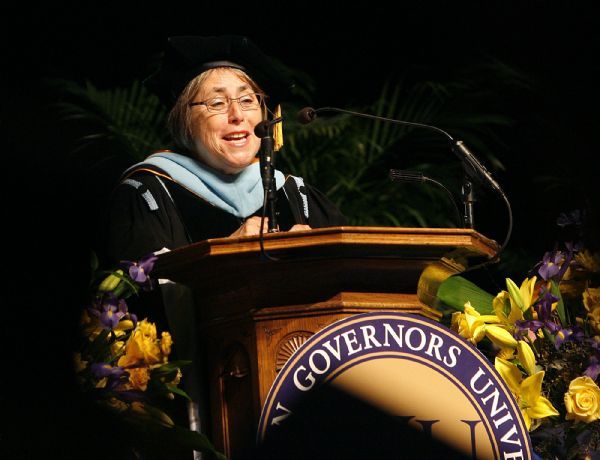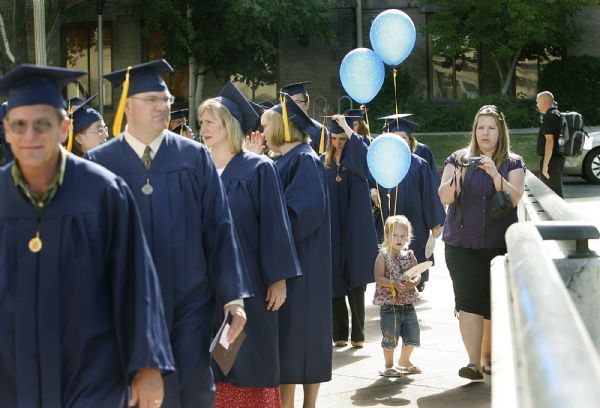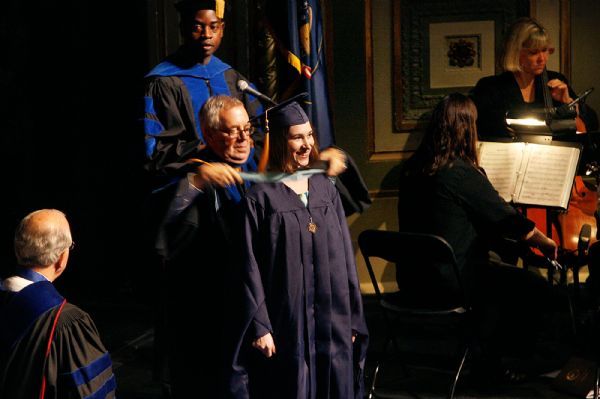This is an archived article that was published on sltrib.com in 2010, and information in the article may be outdated. It is provided only for personal research purposes and may not be reprinted.
In 1995, then-Gov. Michael Leavitt hosted a Western Governors Association conference in Park City, where he broached a touchy subject in one of those governors-only meetings designed for frank talk: Higher education costs too much and is not getting the job done, he said.
"We could see a day when the traditional model would not be sustainable financially. Being able to add increments of bricks and mortar to campus would be prohibitive. We needed something more nimble and efficient," Leavitt said in a recent interview.
The bipartisan gathering was receptive to Leavitt's concerns and charged their Utah colleague with exploring ways to harness the nascent Internet for bringing higher learning to the masses.
"That was the tool that would change the basic paradigm," Leavitt said. "The Internet helped information go to where people are, rather than have the people go to where the information is."
Those discussions spawned Western Governors University, the Salt Lake City-based nonprofit catering to working adults by providing instruction online at an affordable price and awarding degrees based on competency. To say Leavitt's brainchild -- a re-invention of higher education -- has thrived would be an understatement.
A Roy school teacher, Genevieve Kirch, was WGU's first alumna, graduating in a class of one in 2000 with master's degrees in education and technology. This year, the university awarded about 2,000 degrees and enrolls 20,000.
WGU is now regarded as the model for online delivery of curricula as federal and state governments look for ways to replicate it elsewhere. WGU offers degrees in just four job market-oriented areas: health; business, information technology and education.
The programs are tailored for busy adult learners like Kirch and Chevron Wallace, who graduated this year with a bachelor's degree in business management.
--
Competency matters » Health issues pushed Wallace out of high school without a diploma 22 years ago and her education limped along until she heard a radio ad for WGU in 2006. By then she had a decade of management experience and received her high school equivalency diploma after taking community college courses. She had just launched an events-planning business, which she still operates in Atlanta.
"I wanted a college degree for personal satisfaction. Many people thought I was crazy. 'You're doing great, why do you want a degree?' " said Wallace, 40. "I hadn't graduated from anything. It was something I wanted to accomplish for myself."
With her travel and business commitments, attending classes at a typical campus would have been impossible. WGU gave her credit for the general education courses she had completed, as well as for the street wisdom she had accrued from her years in the labor force.
"What you know helps you complete your competencies a lot faster," Wallace said. "In a traditional college, regardless of what I knew, I would have to sit in a classroom three nights a week to get the credit for that one class."
Now enrolled in the WGU master's of business administration program, Wallace was a speaker at the school's July 17 commencement at Kingsbury Hall in Salt Lake City, where she shared the podium with Martha Kanter, a former community college president who now is undersecretary of education in the Obama administration.
Kanter is President Barack Obama's point-person on his graduation initiative, which seeks to make America the world's most educated nation by increasing the portion of the adult population with college degrees from 40 to 60 percent.
The president wants 60 percent of the nation's adults to hold a college degree by 2020, a net gain of 5 million graduates that won't happen without institutions like WGU.
"This new model of flexibility and delivery has allowed you to obtain the traditional degree in a nontraditional way," Kanter told WGU graduates. "As education increasingly embraces the power of online learning, universities like WGU won't seem nontraditional at all. They will likely become the norm."
Leavitt handed Kirch her degree in a ceremony in 2000 in the Utah Capitol's Gold Room. A graduate of Weber State University, Kirch had been teaching for 15 years when she signed up for WGU classes in 1999, a member of the school's first teacher cohort, which received $5,000 scholarships to pursue master's degrees.
I wanted it oddly enough not because of a pay increase, but for the benefit of my classroom and students. If I knew more I would be a more formidable teacher," she said. "When you get a master's, you are doing research. I have learned to use primary sources and statistics. I make sure my outcome is what I wanted."
Going to a traditional campus would have taken her away from her classroom and would have required about nine years, she said. But WGU is not for slouchers.
"You do have to be disciplined. You need time management skills," said Kirch, who still teaches fifth-grade at Roy Elementary.
--
Getting started » In the late 1990s, Leavitt assembled $1 million in seed money from the participating states, then headed to Silicon Valley with his hat in his hand. Flush with IPO cash from the tech boom of the late 1990s, many executives were happy to write six-figure checks to underwrite an institution operating on the digital frontier. WGU started accepting students in 1999.
"We started thinking of it not being a degree-granting institution, but as a clearinghouse for content," Leavitt said. "How do you accredit a university that has no library, but has access to the whole world?"
Under the leadership of CEO Bob Mendenhall, however, WGU did pursue regional accreditation, which it earned in 2003 when it had 500 students. Enrollment has since climbed 30 to 40 percent a year. Every year, the school takes over another suite or two in its building at 4000 South and 700 East. Mendenhall is now hiring 10 to 15 instructors a month to ensure a 60-to-one student-to-faculty ratio.
"That's challenging to find highly qualified people. We have a big ongoing recruiting and hiring effort, but the advantage is we can find them anywhere in the country," Mendenhall said.
The school employs 1,200, half of whom work out of their homes. About 60 percent are faculty, most full-timers earning $40,000 to $100,000. All hold master's degrees and most have doctorates. But the professorial hierarchy common at traditional universities doesn't exist at WGU, which calls all its teachers mentors. The student/mentor ratio is about 60 to 1, much higher than at brick and mortar schools.
"We recognize we are all in this together. We won't be successful without everyone's contribution," Mendenhall said. "We are organized horizontally as opposed to vertically."
Wallace liked her undergraduate experience so much she has returned to WGU to seek a master's in business administration. Annual tuition remains below $6,000, about what the U. charges but without receiving any ongoing taxpayer support. Students can start whenever they like and advance toward degrees as they pass a sequence of "competency units."
"I take great satisfaction that this is now emerging," said Leavitt, who served as President George W. Bush's secretary of Health and Human Services. "The original vision has been met and it is now growing in way that I'm very satisfied by."
Founded in 1999 as a nonprofit, low-cost school catering to working adults, WGU's enrollment has ballooned to more than 20,000 students in all 50 states and has awarded nearly 7,000 degrees. The instruction is conveyed entirely online and degrees are awarded after students demonstrate competency, not according to credit hours they've earned. While it operates out of Salt Lake City, nearly all its students and half its faculty and staff may rarely step foot in its offices. WGU offers baccalaureate and masters degrees in just four areas: business, education, health care and information technology.









